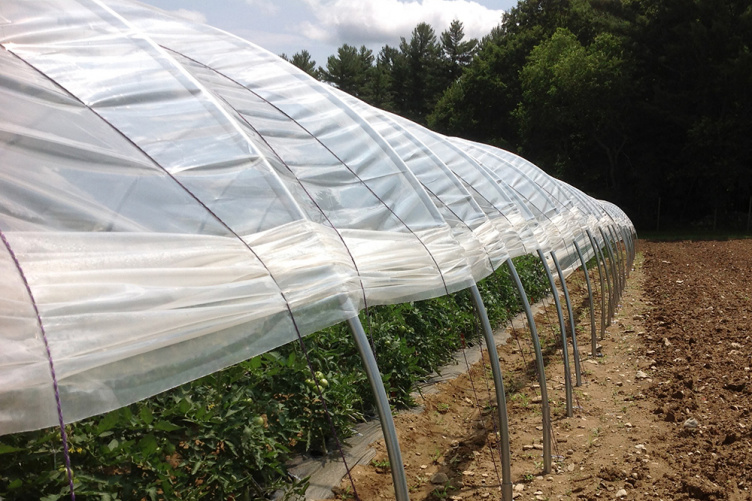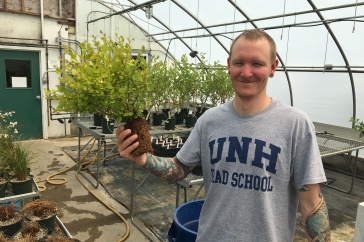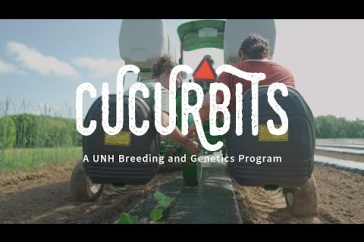
A "caterpillar type" high tunnel at UNH's Woodman Farm. (Photo credit: Becky Sideman)
The University of New Hampshire is one of thirteen universities and colleges selected to participate in partnerships with educational institutions in Peru. Sponsored by an Innovation Fund Grant from 100,000 Strong in the Americas, the UNH team, led by Becky Sideman, Iago Hale and Andrew Ogden from the College of Life Sciences and Agriculture, will work with faculty and students from Universidad Nacional Toribio Rodríguez de Mendoza in Chachapoyas, Peru.
The partnership will allow for a valuable exchange of culture and research, opening the opportunity for both students and faculty to share and develop knowledge and understanding of Andean crop physiology and genetic improvement. The first research program will focus on crop production under plastic tunnels and will lead to additional research projects and greater mobility of students and faculty as this new partnership takes shape.
“We’re very excited about the opportunity for this cross-cultural exchange and are hoping that students from UNH and from Peru benefit from getting to know one another and the opportunities that exist in each other’s countries,” says Sideman. “High tunnel agriculture has had a big impact for farmers in New England, and our Peruvian collaborators think that it has the potential to help them grow crops in the short growing season they have there as well.”
"We’re very excited about the opportunity for this cross-cultural exchange and are hoping that students from UNH and from Peru benefit from getting to know one another and the opportunities that exist in each other’s countries."
At UNH, high tunnel research funded by the New Hampshire Agricultural Experiment Station has been underway for decades. Researchers have had significant successes using these inexpensive, greenhouse-like structures to extend the growing season, increasing quality and yields, and protecting crops from pests. UNH Cooperative Extension has partnered with researchers and growers to bring these advances to the field.
Sideman, an Extension professor of sustainable agriculture and food systems, specialist in sustainable horticulture, and experiment station researcher, has continued this work. Her successes include advances in growing colored bell peppers, tomatoes, spinach and onions grown at the experiment station’s Woodman Horticultural Research Farm. Produce grown in UNH’s on-campus high tunnels at the Fairchild Dairy Teaching and Research Center provide fresh fruits and vegetables year round for UNH Dining Services and UNH Conferences and Catering.
The higher education partnership also will include exchange programs that will give students opportunities to work in teams in both countries, gain technical and linguistic skills, and become more competent for today’s global workforce.
“Peru shares with the U.S. the belief [in] reinforcing understanding in our hemisphere and further strengthening the ties between our people through academic and student exchange,” says Carlos Pareja, Peru’s Ambassador to the U.S. “Thanks to the Innovation Fund, increasing student participation in international exchange programs will enhance our ability to seize the opportunities presented to us and face common challenges in our countries.”
Other participating universities and colleges from the U.S. include California State University, George Mason University, Notre Dame of Maryland University, Pennsylvania State University, Truckee Meadows Community College, Xavier University, Harvard University, University of Washington, University of Central Florida, University of Northern Iowa. Virginia Polytechnic Institute and State University and Western Washington University.
All grant-winning teams will create new student exchange and training opportunities in the fields of environmental science, water resource management, science, engineering and mathematics.
Since January 2014, the Innovation Fund has awarded 147 grants to teams of 288 higher education institutions from 25 countries. Innovation Fund grant awards are $25,000 each with grant-winning teams contributing additional resources on average 1.5 times more to leverage the grant and implement new student exchange programs between the U.S. and in the rest of the Western Hemisphere.
-
Written By:
Sarah Schaier | College of Life Sciences and Agriculture



















































